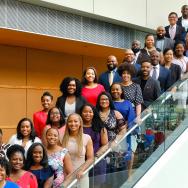Executives from 20 minority- and women-owned businesses recently spoke with leaders from the University of Chicago, UChicago Medicine and the Obama Foundation as part of the Office of Business Diversity’s annual Professional Services Symposium.
Representing the legal, communications, money management, human resources and information technology industries—executives gave PowerPoint presentations and fielded questions to determine if their firms’ capabilities matched the University’s needs.
The Nov. 17-18 virtual event also included a fireside chat with the Rev. Al Sharpton, who discussed the importance of fostering greater diversity in business.
“There is a lot of work to be done in the area of diversity, inclusion and equity,” said symposium organizer Nadia M. Quarles, assistant vice president of business diversity at the University. “It's time for companies, universities, foundations and nonprofits to all seek diverse business talent. It's time for diverse businesses to seek opportunities. That is what this symposium is all about: building relationships and expanding opportunities.”
Widely recognized as a national model for advancing business diversity, the symposium is part of the University’s efforts to increase the number of contracts awarded to minority- and women-owned firms. Since the event began 12 years ago, University officials have met with more than 350 minority- and women-owned professional services firms and paid over $106 million to more than 90 firms.
President Robert J. Zimmer said in his opening remarks that the business diversity program is integral to the mission of the University.
“How do we ensure that, in our business activities, we are bringing in professional service firms that are going to give us a different perspective on complicated problems, and that we are bringing in people who are going to increase our diversity of thought?” he asked. “And how do we help a group of people have an opportunity to realize their talents?”
Supporting minority- and women-owned firms
The professional services industry, the fastest-growing sector of the U.S. economy, is a major contributor to high-wage employment and economic development. But securing business can be challenging for women and minorities, who often lack the personal and professional networks to win contracts.
During the event’s fireside chat, John W. Rogers Jr., co-CEO and chief investment officer at Ariel Investments, commended Zimmer and Quarles for their leadership in supporting minority- and women-owned firms.
“We want the University of Chicago to be a role model and inspire other institutions with what we've been able to do here,” said Rogers, vice chairman of the University’s Board of Trustees and a longtime proponent of business diversity.
Rogers said universities, hospitals, museums and other institutions often limit their diversity efforts to construction, catering and janitorial services. He said that developing opportunities in sectors such as money management, legal services, advertising services and public relations can require sustained effort to overcome “implicit, unconscious bias.”
Expanding opportunities in asset management
During the fireside chat, Quarles, Rogers and Sharpton stressed that creating new economic opportunities is a vital next step in the ongoing struggle for civil rights.
Sharpton has advocated for corporations, universities, unions and other entities to hire minority firms, and he recently has highlighted the importance of retaining diverse asset management firms for university endowments. Although asset management represents a $69 trillion industry, minority- and women-owned firms only manage 1.3% of those funds, despite comparable performance with majority firms, according to a 2019 study funded by the Knight Foundation.
In 2010, UChicago hired its first two African American asset management firms. Ten years later, the endowment has allocated a total of $1.4 billion to 24 minority- and women-owned asset management firms.
But the resistance of many universities to open up opportunities has produced “a glaring contradiction” to their other statements on diversity, Sharpton said.
“Let us compete under the same rules ... and show that we can deliver and outperform,” Sharpton said. “But we see more of a defense and a roadblock than we see a highway toward an inclusive society that all of us claim that we want to have.”
Systemic racism, Rogers added, “really hurts our ability to build strong African American companies that can create multi-generational wealth and opportunity and multi-generational philanthropy for our communities.”
Business Diversity Impact Award
During the symposium, Ivan Samstein, a University vice president and its chief financial officer, was presented with the John W. Rogers Jr. Business Diversity Impact Award. Samstein and his Financial Services team were recognized for hiring and maintaining long-term relationships with several minority-owned accounting and other financial services firms. Last March, two minority-owned firms, for the first time, were retained to co-manage the underwriting syndicate for the University's bond issuance.
